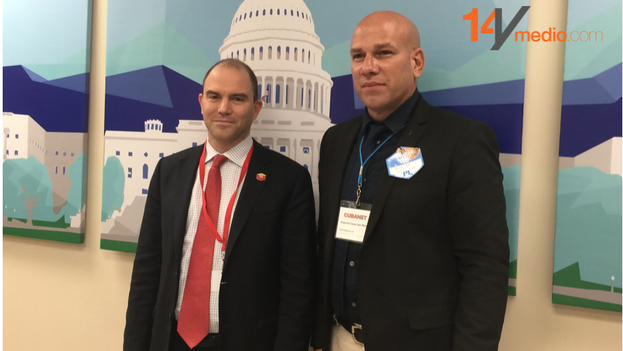
![]() 14ymedio, Havana, 22 March 2016 — Ben Rhodes, senior adviser to President Barack Obama on policy toward Cuba, said Tuesday that today connection to the internet is “the right to access information. There are no limitations now from the United States on Cubans connecting to the internet, there are no justifications now for the Cuban government to say that we are putting limits on connectivity,” said the official.
14ymedio, Havana, 22 March 2016 — Ben Rhodes, senior adviser to President Barack Obama on policy toward Cuba, said Tuesday that today connection to the internet is “the right to access information. There are no limitations now from the United States on Cubans connecting to the internet, there are no justifications now for the Cuban government to say that we are putting limits on connectivity,” said the official.
Rhodes will give a lecture exclusively for the independent press in the United States embassy in Havana, which is a boost to the unofficial media on the island.
With regards to the blockade that the Cuban government maintains on 14ymedio – which cannot be viewed from Cuba-based ISPs – the official said that he raised his “concern” to the authorities with regard to their treatment of independent media on the island and, he explained, they “essentially reject the presence of certain media that are not to their liking; they identify them with political activities that they also find not to their liking. What we have said and what we have emphasized,” he continued, “is that journalism is journalism; it is not dissent, it is journalism.
“What we can do as the United States government,” he said, “is to treat all media equally.”
Rhodes returned to the need to expand internet access for Cubans, an issue also addressed by President Obama on Tuesday in his speech from the Alicia Alonso Gran Teatro in Havana.
“We have eliminated many of the justifications that the Cuban government has used to say that we are putting limits [on the internet],” he explained. He added, “We have no secret agendas or plans for Cuba, we are saying what we are doing.”
Rhodes acknowledged that the fear that the Cuban Adjustment Act will be revoked has caused a sharp increase in migrants to the US. However, he reiterated that there will be no changes in the rules for now, but hopes that the United States government has an opportunity to reform the immigration system as a whole. “It is important that people understand that they should not emigrate because they are expecting [this law] will disappear,” he added.
“Frankly, the best thing that could happen to prevent migration is that there are reforms in the economy of Cuba to open more opportunities, but, clearly, it is a process that will take time”, he said.
The official was optimistic about the lifting of the embargo on the island and revealed that it “may happen sooner than people can imagine now.
“The question people should ask is how far can this go. I think there is support in the sense of lifting the embargo, but it will also depend on the actions of the Cuban government,” he said, and an improvement of the situation of human rights on the island or wider access to Internet could facilitate Congress voting in favor of a rule change.
